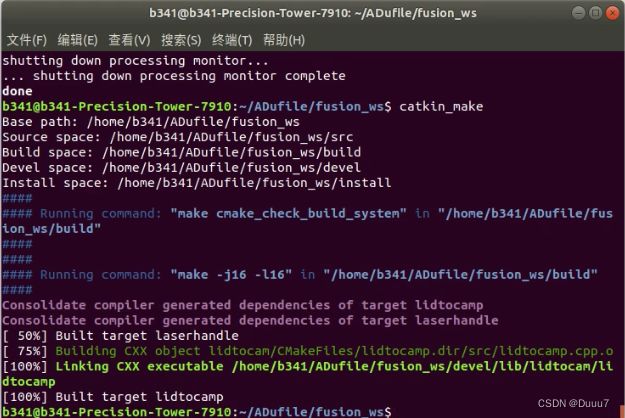【ROS】利用ROS将KITTI数据集点云数据投影到2D图像
课题涉及到感知融合,首先需要将点云投影到图像上,本文利用ROS实现投影。分为两个ROS节点,一个节点负责不断读取点云原始bin文件,并以 sensor_msgs::PointCloud2 的消息格式发布话题;另一个节点对接收到的点云消息进行处理,把点云投影到相机图像上。
目录
- 笔者环境
- 一、创建ROS工作空间
-
- 1. 创建工作空间目录
- 2. 编译工作空间
- 3. 设置环境变量
- 二、创建投影功能包
-
- 1. 统一格式
- 2. 创建点云投影功能包
- 3. 编写节点cpp文件
- 三、创建launch功能包
-
- 1. 创建launch包
- 2. 创建 run.launch 文件
- 3. 编写 run.launch 文件
- 四、在project功能包添加其他依赖
-
- 1. 修改project目录下的CMakeLists.txt
- 2. 修改project目录下的package.xml
- 五、编译project功能包
- 六、投影效果展示
笔者环境
Ubuntu18.04+ ROS Melodic + Opencv 3.2.0 + Eigen 3.3.7 + PCL 1.8.0
测试数据集是Kitti的raw_data的2011_09_26(如果使用其他天的数据,需要在lidtocamp.cpp中修改标定数据)
一、创建ROS工作空间
1. 创建工作空间目录
这步比较基础,目的是在src文件中创建了一个 CMakeLists.txt 的文件,告诉系统这个是ROS的工作空间
#创建catkin_ws和src目录
mkdir -p ~/catkin_ws/src
#进入src目录下,并进行文件夹初始化
cd ~/catkin_ws/src
catkin_init_workspace
2. 编译工作空间
在catkin_ws文件夹下进行编译:
cd ~/catkin_ws/
catkin_make
编译完成后,catkin_ws中新增build 和 devel
3. 设置环境变量
安装ROS的时候是将整个ros系统的环境变量设置到bash脚本中,现在我们需要把我们工作空间的环境变量设置到bash中。
#打开系统变量文件
gedit ~/.bashrc
#在文件末加入
source ~/catkin_ws/devel/setup.bash
#更新变量文件
source ~/.bashrc
如果想查看ros的环境变量: echo $ROS_PACKAGE_PATH
终端输出:/home/wdd/catkin_ws/src : /opt/ros/kinetic/share
第一个为我们刚创建工作空间的,第二个是ROS系统的
二、创建投影功能包
1. 统一格式
在src目录下创建
catkin_create_pkg package_name depend1 depend2 depend2
package_name:功能包名称
depend:依赖项
2. 创建点云投影功能包
在src目录下使用 catkin_create_pkg 创建一个 package 包并添加 roscpp 和 std_msgs 依赖项
catkin_create_pkg Lid_project_cam roscpp std_msgs
std_msgs:包含常见消息类型
roscpp:使用C++实现ROS各种功能
(如果使用python实现ROS各种功能,添加rospy)
3. 编写节点cpp文件
在功能包目录的src文件夹下创建节点文件:
cd Lid_project_cam/src
#发布节点
touch laserhandle.cpp
#接受节点
touch lidtocamp.cpp
感谢这位博主提供的代码:https://blog.csdn.net/qq_33287871/article/details/107587233
laserhandle.cpp:
#include lidtocamp.cpp:
#include 三、创建launch功能包
1. 创建launch包
在catkin_ws/src下用 catkin_create_pkg 创建 launch 包,不添加任何依赖项
catkin_create_pkg launch
2. 创建 run.launch 文件
进入 ~/catkin_ws/src/launch 目录,创建 run.launch 文件
cd launch
touch run.launch
3. 编写 run.launch 文件
分为两个ROS节点,一个节点负责不断读取点云原始bin文件,并以 sensor_msgs::PointCloud2 的消息格式发布话题;另一个节点对接收到的点云消息进行处理,把点云投影到相机图像上。
内容如下:
<launch>
<node pkg="Lid_project_cam" name = "laserhandle" type = "laserhandle" output="screen" />
<node pkg="Lid_project_cam" name = "lidtocamp" type = "lidtocamp" output="screen" />
</launch>
四、在project功能包添加其他依赖
因为投影过程中要用到PCL,可视化要用到Opencv,所以我们需要加入PCL和Opencv的依赖到投影功能包中
1. 修改project目录下的CMakeLists.txt
(1)修改find_package
find_package(catkin REQUIRED COMPONENTS
roscpp
rospy
std_msgs
sensor_msgs
cv_bridge
image_transport
pcl_conversions
pcl_ros
)
find_package(OpenCV REQUIRED)
(2)修改include_directories
include_directories(
# include
${catkin_INCLUDE_DIRS}
${OpenCV_INCLUDE_DIRS}
)
(3)生成可执行文件并连接到库
add_executable(laserhandle src/laserhandle.cpp)
target_link_libraries(laserhandle ${catkin_LIBRARIES} ${OpenCV_LIBRARIES})
add_executable(lidtocamp src/lidtocamp.cpp)
target_link_libraries(lidtocamp ${catkin_LIBRARIES} ${OpenCV_LIBRARIES})
2. 修改project目录下的package.xml
在package.xml添加:
<build_depend>libpcl-all-dev</build_depend>
<exec_depend>libpcl-all</exec_depend>
五、编译project功能包
#cd到catkin_ws下,编译整个工程
cd ~/catkin_ws/
catkin_make
显示下图则编译成功,在/catkin_ws/devel/lib/project下有了两个可执行文件:laserhandle和lidtocamp

六、投影效果展示
启动run.launch文件,实现节点收发
roslaunch launch run.launch
投影效果如下图所示:
演示视频:https://www.bilibili.com/video/BV1XL4y1A7zN?spm_id_from=333.999.0.0&vd_source=85578835a77d53d45d756c48a7f801c6
参考致谢:
https://blog.csdn.net/qq_43944331/article/details/117470536
https://blog.csdn.net/EchoChou428/article/details/105257293
https://blog.csdn.net/qq_28306361/article/details/85142192
https://blog.csdn.net/qq_33287871/article/details/107587233